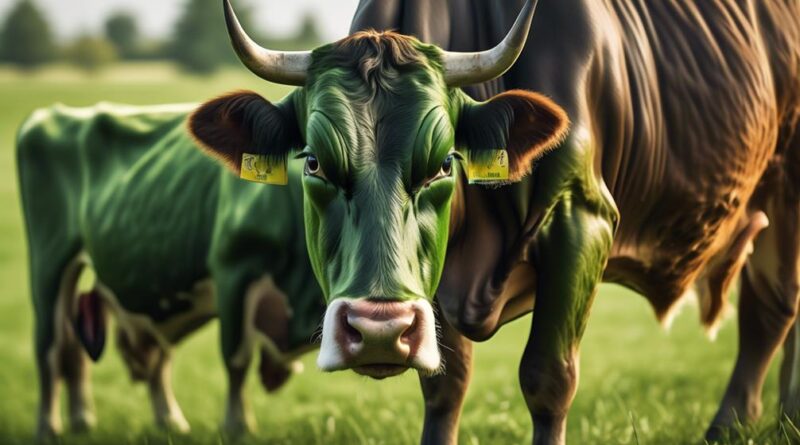The Role of Genetics in Cattle Health Explained
Did you know that genetics play a significant role in determining the health and disease resistance of cattle?
As a cattle farmer or someone involved in the agricultural industry, understanding the impact of genetics on cattle health is crucial for making informed breeding and management decisions.
The influence of genetics on various health aspects of cattle is a complex and fascinating subject that can greatly affect the overall well-being of your herd.
But how exactly do genetics influence cattle health, and what are the practical implications for you as a farmer or industry professional?
Basics of Cattle Genetics
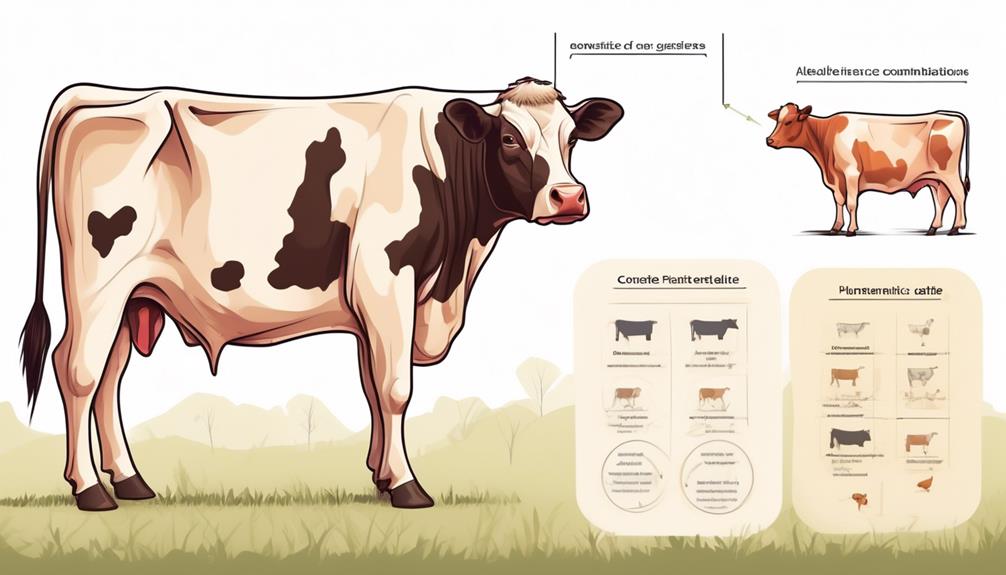
Understanding the basics of cattle genetics is essential for anyone involved in cattle breeding or health management. When it comes to cattle breeding, genetic testing plays a pivotal role in making informed decisions. Genetic testing allows breeders to identify desirable traits and potential health concerns in their cattle, enabling them to make strategic breeding choices that can improve the overall quality of the herd.
Genetic testing in cattle breeding involves analyzing the DNA of individual animals to gain insights into their genetic makeup. This process helps breeders understand the heritability of certain traits, such as disease resistance, milk production, or meat quality. By identifying cattle with favorable genetic profiles, breeders can selectively breed animals that are more likely to pass on these desirable traits to their offspring. This targeted approach to breeding can lead to healthier and more productive cattle over time.
In addition to selecting for positive traits, genetic testing also allows breeders to identify and manage potential health issues within their herds. By screening for genetic predispositions to certain diseases or conditions, breeders can take proactive measures to minimize the risk of these health concerns emerging in their cattle population. This proactive approach to health management can lead to reduced veterinary costs and improved overall herd welfare.
Inherited Health Conditions
In cattle genetics, the identification of inherited health conditions plays a crucial role in proactive herd management and disease prevention. Genetic testing for inherited traits has become an essential tool for cattle breeders and farmers. Through genetic testing, inherited health conditions such as Johne's disease, bovine leukocyte adhesion deficiency, and various genetic defects can be identified, allowing for informed breeding decisions and proactive management strategies.
Genetic testing enables the early detection of inherited health conditions, providing an opportunity to prevent the spread of these conditions within the herd. By identifying carriers and affected animals, breeders can make informed decisions to avoid mating combinations that could result in offspring with these health issues. This proactive approach significantly reduces the prevalence of inherited health conditions within the herd over time.
Inherited health conditions can have detrimental effects on the overall health and productivity of cattle. Through genetic testing, breeders can work towards reducing the occurrence of these conditions, ultimately leading to healthier and more resilient herds. Additionally, genetic testing allows for the selection of cattle with favorable genetic profiles, contributing to the overall improvement of herd health and performance.
Genetic Selection for Disease Resistance
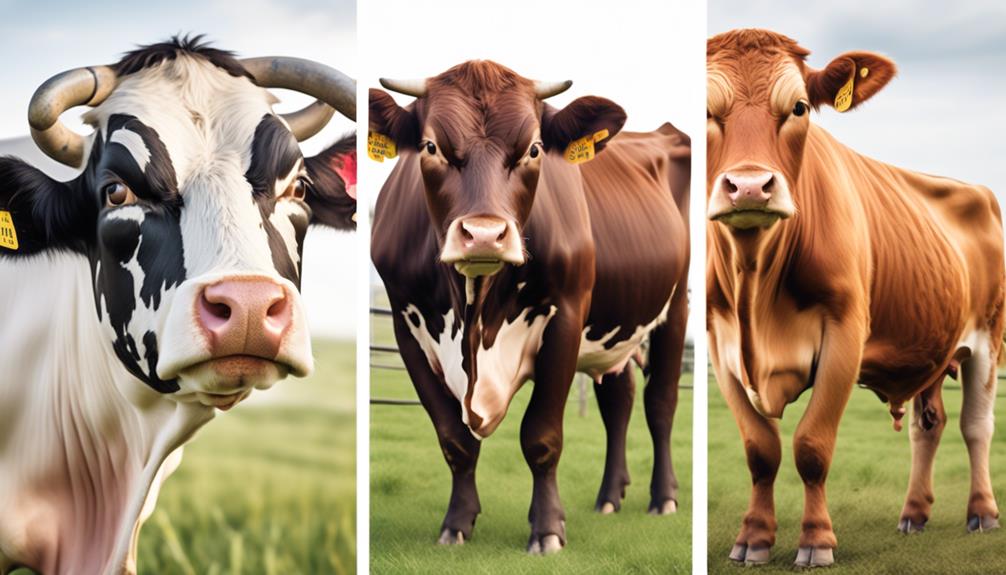
The proactive management strategies enabled by genetic testing for inherited health conditions naturally lead to a focus on genetic selection for disease resistance in cattle. This approach holds significant promise in enhancing overall herd health and productivity, thereby benefiting both the animals and the farmers. Here's why genetic selection for disease resistance is crucial:
- Enhanced Disease Prevention:
By identifying and breeding cattle with genetic predispositions for disease resistance, farmers can proactively reduce the occurrence of various illnesses within their herds. This, in turn, minimizes the need for extensive veterinary interventions and medications, leading to cost savings and improved animal welfare.
- Improved Herd Resilience:
Selecting for disease resistance at the genetic level contributes to the development of more resilient herds. This means that even when exposed to pathogens, cattle are better equipped to fend off illnesses, resulting in reduced production losses and maintenance of overall herd productivity.
- Sustainable Farming Practices:
Genetic selection for disease resistance aligns with sustainable farming practices by reducing the reliance on antibiotics and other pharmaceuticals. This not only benefits the environment but also helps mitigate the potential development of antibiotic resistance in livestock.
- Long-Term Economic Benefits:
Investing in genetic selection for disease resistance can yield long-term economic benefits for farmers. By minimizing disease-related setbacks, they can optimize their operational efficiencies and ultimately enhance their bottom line.
Through the strategic integration of genetic testing and disease prevention efforts, cattle farmers can foster healthier and more resilient herds, ultimately bolstering the sustainability and profitability of their operations.
Impact of Genetic Diversity
Promoting genetic diversity within your cattle herd can significantly impact the overall resilience and adaptability of the population to environmental and health challenges. Genetic diversity plays a crucial role in the population's ability to adapt and thrive in changing conditions.
When your cattle herd exhibits a wide range of genetic variation, it enhances the potential for genetic adaptation to occur. This means that in the face of new diseases or environmental stressors, there's a higher likelihood of some individuals possessing genetic traits that confer resistance or resilience.
Moreover, a genetically diverse population is better equipped to withstand unexpected challenges. For instance, if a particular disease outbreak targets a specific genetic trait, a genetically homogeneous herd could be severely impacted. However, with genetic diversity, some individuals may possess traits that make them less susceptible to the disease, thereby ensuring the overall health and productivity of the herd.
Population resilience, which is the ability of a population to withstand and recover from adverse conditions, is greatly influenced by genetic diversity. By maintaining a diverse genetic pool within your cattle herd, you're essentially bolstering its capacity to adapt to changing environments and mitigate health risks.
This can ultimately lead to a more sustainable and robust cattle population, better equipped to thrive in the face of various challenges.
Breeding Strategies for Health Improvement
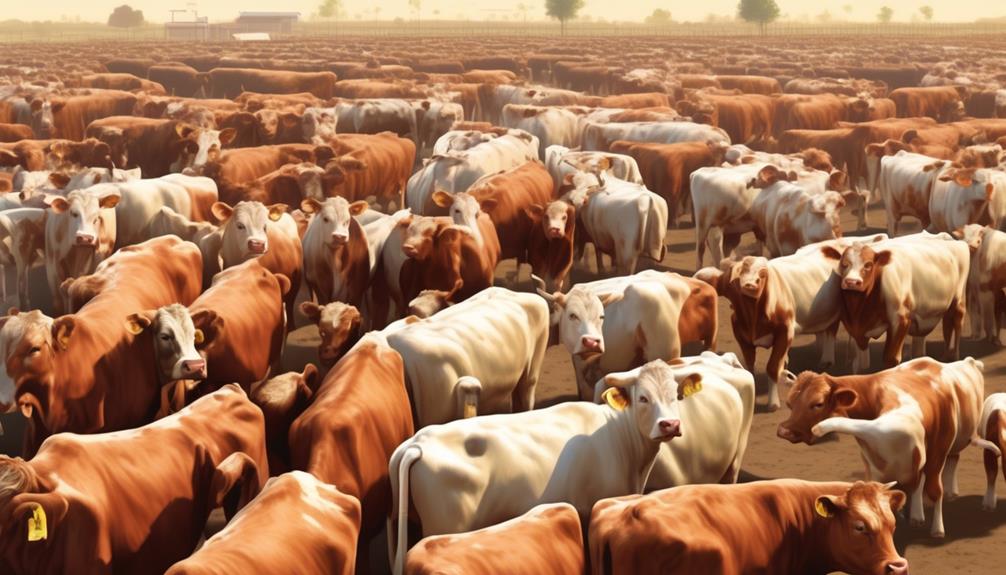
To further enhance the health and resilience of your cattle herd, consider implementing specific breeding strategies aimed at improving genetic traits associated with disease resistance and overall well-being. By employing the right breeding techniques, you can effectively manage the health of your herd and promote a more robust genetic makeup.
Here are four key breeding strategies to consider for the improvement of your cattle's health:
- Selective Breeding: Identify and choose animals with a history of disease resistance and overall good health for mating, thereby passing on these favorable genetic traits to future generations.
- Crossbreeding: Introduce genetic diversity into your herd by crossing different breeds known for their resistance to specific diseases, which can lead to a more resilient and healthier overall herd.
- Genomic Selection: Utilize advanced genetic testing to identify specific genetic markers associated with disease resistance and overall health, allowing for more precise selection of breeding animals.
- Health-focused Breeding Goals: Set clear breeding goals that prioritize disease resistance, overall well-being, and other health-related traits, ensuring a deliberate focus on improving the health of your herd through selective breeding.
Genetic Markers for Disease Susceptibility
Identifying genetic markers linked to disease susceptibility in cattle enables targeted breeding strategies for improving overall herd health and resilience. Genetic testing plays a crucial role in identifying these markers, allowing for proactive disease prevention efforts within cattle herds.
By understanding the genetic predisposition to certain diseases, breeders can make informed decisions to reduce the prevalence of these illnesses and enhance the overall health of their cattle.
Genetic testing for disease susceptibility involves analyzing the DNA of individual animals to identify specific genetic markers associated with increased risk for certain diseases. This information empowers breeders to selectively breed cattle with lower susceptibility to these diseases, thereby reducing the likelihood of illness within the herd.
Through strategic breeding based on genetic markers, the prevalence of disease can be effectively managed, leading to improved overall herd health.
In addition to reducing the incidence of diseases, genetic markers for disease susceptibility also contribute to the resilience of cattle herds. By selectively breeding for genetic resistance to specific illnesses, breeders can enhance the overall robustness of their herds, ultimately minimizing the impact of diseases on productivity and welfare.
Role of Genomics in Cattle Health
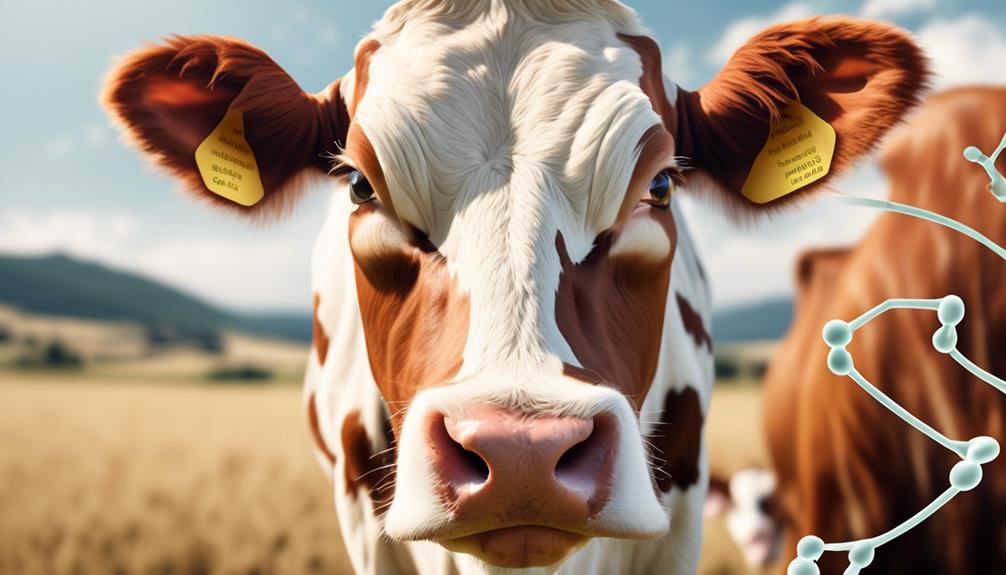
Have you considered how genetic markers for disease susceptibility can shape the application of genomics in enhancing cattle health and resilience? Genomic testing plays a crucial role in understanding the genetic predisposition to various diseases and can significantly impact the health management strategies for cattle. Here are four key aspects to consider:
- Precision Breeding: Genomic testing allows for the identification of specific genetic variations associated with disease resistance or susceptibility. This enables cattle breeders to make informed decisions when selecting animals for breeding, leading to the propagation of resilient and healthy herds.
- Early Disease Detection: Genomics aids in early disease detection by identifying genetic markers linked to various health conditions. By implementing genomic testing, cattle producers can proactively monitor and manage the health of their animals, potentially reducing the spread and impact of diseases within their herds.
- Tailored Health Interventions: Understanding the genetic makeup of cattle through genomics enables the development of tailored health management strategies. This includes targeted vaccination programs and personalized treatment plans based on individual genetic predispositions to certain diseases.
- Enhanced Productivity: By leveraging genomics for health management, cattle producers can work towards enhancing overall productivity within their herds. Healthier animals are likely to exhibit improved growth rates, reproductive performance, and overall resilience, ultimately benefiting the efficiency and sustainability of cattle farming operations.
Incorporating genomic testing into cattle health management strategies holds the potential to revolutionize the way diseases are managed and prevented, ultimately contributing to the well-being and productivity of cattle herds.
Future of Genetic Research in Cattle Health
Considering the rapid advancements in genetic research, cattle health is poised for significant improvements in the near future. The future of genetic research in cattle health holds great promise for the industry. With the constant evolution of technology and research methodologies, there's an increasing emphasis on ethical implications and environmental consequences.
As genetic research progresses, it's crucial to consider the ethical implications of genetic manipulation and breeding practices. This involves careful consideration of animal welfare, ensuring that genetic research is conducted in a manner that respects the well-being of the cattle involved.
Additionally, the environmental consequences of genetic research in cattle health must be taken into account. As genetic advancements continue, it's important to assess how these developments may impact the environment, such as potential changes in cattle habitats and grazing patterns.
Furthermore, the future of genetic research in cattle health also raises questions about the potential environmental consequences of genetic modifications. It's essential to evaluate how genetic alterations might affect the ecological balance and sustainability of cattle farming practices.
As research in this field progresses, it's imperative to maintain a balanced approach that takes into account the ethical implications and environmental consequences associated with genetic advancements in cattle health. By doing so, the industry can ensure that genetic research leads to positive outcomes for both cattle and the environment.
Frequently Asked Questions
How Do Environmental Factors Play a Role in the Expression of Genetic Health Conditions in Cattle?
Environmental influences can impact genetic expression in cattle. Factors like diet, climate, and exposure to toxins can affect the manifestation of genetic health conditions. Understanding how these environmental factors interact with genetics is vital in maintaining cattle health.
What Are Some Ethical Considerations in Using Genetic Selection for Disease Resistance in Cattle?
When using genetic selection for disease resistance in cattle, ethical considerations are crucial. Breeding strategies must prioritize animal welfare and genetic diversity. Genetic selection should be balanced with sustainable farming practices to ensure long-term cattle health.
Are There Any Current Challenges in Implementing Breeding Strategies for Health Improvement in Cattle?
Implementing breeding strategies for cattle health faces challenges due to genetic variations, health conditions, and environmental factors. Overcoming these obstacles requires a comprehensive approach that integrates genetic selection with management practices for optimal results.
What Are the Potential Limitations of Using Genetic Markers for Disease Susceptibility in Cattle?
When using genetic testing for disease susceptibility in cattle, potential challenges may arise due to the complexity of genetic markers. Understanding these limitations is crucial for effective breeding strategies to improve cattle health.
How Might Advancements in Genetic Research Impact the Cost and Accessibility of Genetic Testing for Cattle Health in the Future?
Advancements in genetic research could reduce the cost of genetic testing for cattle health, making it more accessible. This could help overcome current accessibility barriers and lead to widespread use of genetic testing for better cattle health management.
Conclusion
So, now you understand the important role genetics plays in cattle health.
It's crucial to consider inherited health conditions and genetic diversity when breeding for disease resistance.
Genetic markers and genomics are valuable tools for identifying and improving cattle health.
With ongoing genetic research, the future looks promising for advancing cattle health through breeding strategies and disease susceptibility detection.
Keep an eye on new developments in cattle genetics for healthier herds in the future.
